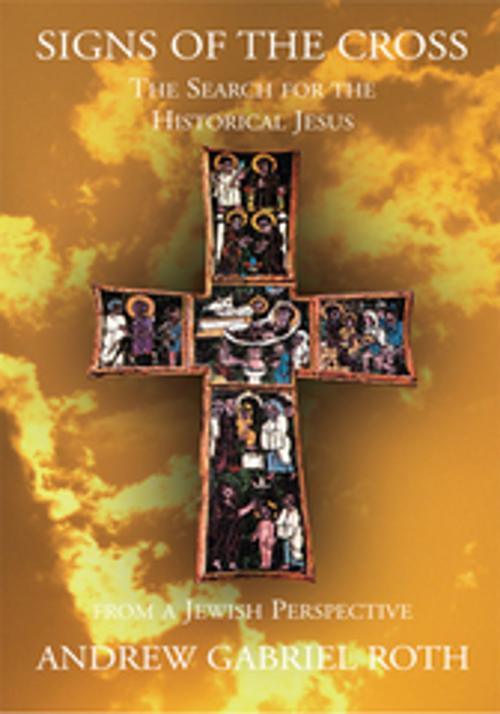Signs of the Cross: the Search for the Historical Jesus
From a Jewish Perspective
Nonfiction, Religion & Spirituality, Reference, History| Author: | Andrew Gabriel Roth | ISBN: | 9781469113234 |
| Publisher: | Xlibris US | Publication: | June 5, 2001 |
| Imprint: | Xlibris US | Language: | English |
| Author: | Andrew Gabriel Roth |
| ISBN: | 9781469113234 |
| Publisher: | Xlibris US |
| Publication: | June 5, 2001 |
| Imprint: | Xlibris US |
| Language: | English |
***SEE BELOW FOR AN IMPORTANT UPDATE!!!***
While the dawn of the new millennium has brought an unprecedented interest to the field of New Testament studies and the search for the historical Jesus, a critical piece in early Christian development has been noticeably absent:
Tertullus laid charges against Paul in the following address to the governor: "Your Excellencywe have found him to be a troublemakera ringleader of the sect known as the Nazarenes
Paul said "I admit that I follow the Way, which they call a sect. I worship the God of our ancestors, and I firmly believe the Jewish law and everything written in the books of prophecy. I have hope in God, just as these men do, that he will raise both the righteous and the ungodly.
Acts 24:2,5,11-15 (NLT)
Put simply, the world has so embraced the story of how the apostle Paul took a small Jewish apocalyptic sect and transformed it into a global Gentile movement, that it has forgotten the very first followers of Jesus, otherwise known as Nazarenes. What were they like, and how did their beliefs differ from the Roman based model that sprang up later? Even from the Catholic fathers, we are given some tantalizing clues:
But these sectariansdid not call themselves Christians, but Nazarenes, however they are simply complete Jews. They use not only the New Testament but the Old Testament as well, as the Jews doThey have no different ideas, but confess everything exactly as the Law proclaims it and in the Jewish fashion, except for their belief in the Messiah, if you please! For they acknowledge both the resurrection of the dead and the divine creation of all things, and declare that God is one, and that His Son is Yshua the Messiah. They are trained to a nicety in Hebrew. For among them the entire Law, Prophets and theWritingsare read in Hebrew, as they surely are by the Jews. They are different from the Jews, and different from Christians, only in the following. They disagree with the Jews for they have come to faith in Messiah; but since they are still fettered with the Lawcircumcision and the Sabbath, and the restthey are not in accord with ChristiansThey have the Good News according to Matthew in its entirety in Hebrew. For it is clear they still preserve this, in the Hebrew alphabet, as it was originally written.
Epiphanus; Panarion 29 (fourth century)
Are these Nazarenes actually the unknown continuation of the Apostle Pauls ministry? What about the Jerusalem Church mentioned so frequently by Paul and headed up by Peter and James the Just? Why is it only now that we can tell the story of Christendoms most influential group throughout its first fifty years andabove allwhat happened to them?
Furthermore, even a casual glance at any New Testament will show the Gospel of Matthew given the honor of being the first book in the collection. Such an arrangement, directly derived from ancient belief of what was written when, is currently ignored because modern scholarship accords this honor to Mark. Similarly, while the scholarly world has all but forgotten the Nazarenes, they have proclaimed almost universally that the New Testament was originally written in Greek, despite strong early testimony and clear textual evidence to the contrary.
However, since the fourth century, the Nazarenes at some time seem to have vanished off the face of the earth. As a result, their existence has now been rendered into little more than a footnote in history, and their connection to the original Christian movement and their Semitic scriptures, have been believed to be lost forever.
That is, until now.
Now, for the first time, a modern Nazarene breaks his silence and details the results of more than four years of research in his provocative new book Signs of the Cross. As a work destined to turn upside down the current Greek compositional model of the New Testament, Signs of the Cross breaks new grou
***SEE BELOW FOR AN IMPORTANT UPDATE!!!***
While the dawn of the new millennium has brought an unprecedented interest to the field of New Testament studies and the search for the historical Jesus, a critical piece in early Christian development has been noticeably absent:
Tertullus laid charges against Paul in the following address to the governor: "Your Excellencywe have found him to be a troublemakera ringleader of the sect known as the Nazarenes
Paul said "I admit that I follow the Way, which they call a sect. I worship the God of our ancestors, and I firmly believe the Jewish law and everything written in the books of prophecy. I have hope in God, just as these men do, that he will raise both the righteous and the ungodly.
Acts 24:2,5,11-15 (NLT)
Put simply, the world has so embraced the story of how the apostle Paul took a small Jewish apocalyptic sect and transformed it into a global Gentile movement, that it has forgotten the very first followers of Jesus, otherwise known as Nazarenes. What were they like, and how did their beliefs differ from the Roman based model that sprang up later? Even from the Catholic fathers, we are given some tantalizing clues:
But these sectariansdid not call themselves Christians, but Nazarenes, however they are simply complete Jews. They use not only the New Testament but the Old Testament as well, as the Jews doThey have no different ideas, but confess everything exactly as the Law proclaims it and in the Jewish fashion, except for their belief in the Messiah, if you please! For they acknowledge both the resurrection of the dead and the divine creation of all things, and declare that God is one, and that His Son is Yshua the Messiah. They are trained to a nicety in Hebrew. For among them the entire Law, Prophets and theWritingsare read in Hebrew, as they surely are by the Jews. They are different from the Jews, and different from Christians, only in the following. They disagree with the Jews for they have come to faith in Messiah; but since they are still fettered with the Lawcircumcision and the Sabbath, and the restthey are not in accord with ChristiansThey have the Good News according to Matthew in its entirety in Hebrew. For it is clear they still preserve this, in the Hebrew alphabet, as it was originally written.
Epiphanus; Panarion 29 (fourth century)
Are these Nazarenes actually the unknown continuation of the Apostle Pauls ministry? What about the Jerusalem Church mentioned so frequently by Paul and headed up by Peter and James the Just? Why is it only now that we can tell the story of Christendoms most influential group throughout its first fifty years andabove allwhat happened to them?
Furthermore, even a casual glance at any New Testament will show the Gospel of Matthew given the honor of being the first book in the collection. Such an arrangement, directly derived from ancient belief of what was written when, is currently ignored because modern scholarship accords this honor to Mark. Similarly, while the scholarly world has all but forgotten the Nazarenes, they have proclaimed almost universally that the New Testament was originally written in Greek, despite strong early testimony and clear textual evidence to the contrary.
However, since the fourth century, the Nazarenes at some time seem to have vanished off the face of the earth. As a result, their existence has now been rendered into little more than a footnote in history, and their connection to the original Christian movement and their Semitic scriptures, have been believed to be lost forever.
That is, until now.
Now, for the first time, a modern Nazarene breaks his silence and details the results of more than four years of research in his provocative new book Signs of the Cross. As a work destined to turn upside down the current Greek compositional model of the New Testament, Signs of the Cross breaks new grou















